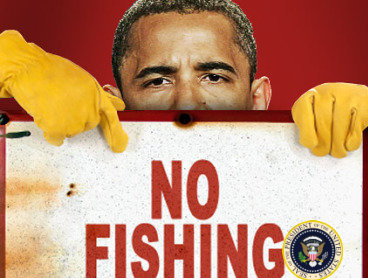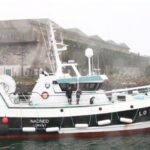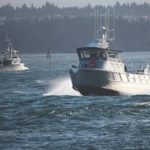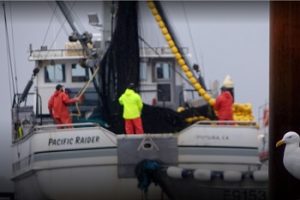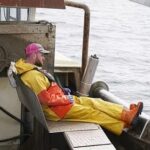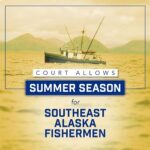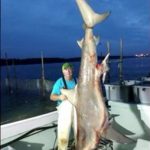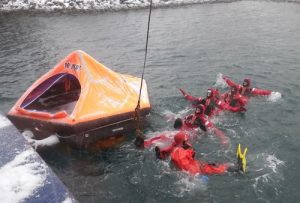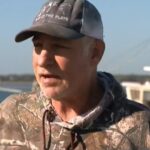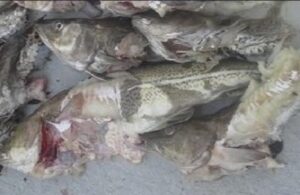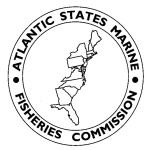Tag Archives: Chile
Rare ‘football fish’ washes up near Cannon Beach
 A deep-sea angler fish, called a Pacific football fish (Himantoliphus sagamius) has been found by local beachcombers just south of Cannon Beach. Living in complete darkness, at 2,000 to 3,300 feet, these fish are rarely seen. In fact, only 31 specimens have been recorded around the world. While a handful of football fish have been recorded in New Zealand, Japan, Russia, Hawaii, Ecuador, Chile and California, this is the first one reported on the Oregon Coast to the knowledge of personnel at Seaside Aquarium, who announced the find. Photos, more, >>CLICK TO READ<< 10:38
A deep-sea angler fish, called a Pacific football fish (Himantoliphus sagamius) has been found by local beachcombers just south of Cannon Beach. Living in complete darkness, at 2,000 to 3,300 feet, these fish are rarely seen. In fact, only 31 specimens have been recorded around the world. While a handful of football fish have been recorded in New Zealand, Japan, Russia, Hawaii, Ecuador, Chile and California, this is the first one reported on the Oregon Coast to the knowledge of personnel at Seaside Aquarium, who announced the find. Photos, more, >>CLICK TO READ<< 10:38
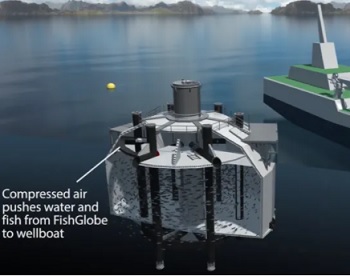
The last cowboys – a replay of the story of cattle in the American West
Norway, a country less than a quarter the size of Alaska, is on pace to bring 1.2 million tonnes of salmon to market this year, and the technologists in that country are talking about the potential to grow their production to 3 million tonnes per year by 2030. Chile, Scotland, the Faroe Islands, and Canada are all significant producers with lesser production in Australia, New Zealand, Iceland, France, Ireland and Finland. Meanwhile, land-based, recirculating aquaculture systems (RAS) farms are threatening to lead to an explosion in salmon aquaculture almost everywhere. To truly understand the threat these farmers pose to the future of one of Alaska’s oldest and still largest industries,,, >click to read< 08:52
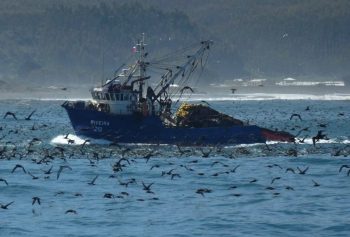
Chile purse seine project nominated for conservation award
In October, the Pink-footed Shearwaters begin to arrive on Robinson Crusoe Island, off the coast of Chile. “These [fishing fleets] are fishing in the same areas as these birds. They are capturing the very fish these seabirds eat,” said Cristian Suazo, a member of the Albatross Task Force Chile, which is working to combat bycatch. “The fleets are also out at the same time these birds, many of which are migratory, have the greatest need for food to both refuel and to feed their young.”,,, In Chile, the ATF has been working since 2007, where it began by trying to reduce bycatch in pelagic longline fisheries. In 2013 though, the team noted that there was also bycatch coming from purse seine fisheries, and began working to reduce bycatch in this industry as well. >click to read<17:43
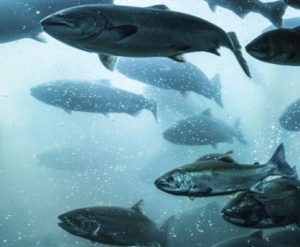
Chile accuses Marine Harvest of damaging environment after 600,000 salmon injected with antibiotics escape
Chile’s environment ministry on Monday (Aug 6) accused the local unit of Norway’s Marine Harvest of damaging the environment after hundreds of thousands of salmon escaped from one of the company’s fisheries last month. The ministry said in a statement that it had asked the State Defense Council, which represents the government in legal matters, to investigate the incident and initiate legal action against Marine Harvest with the aim of repairing the environmental damage. Some of the 600,000 fish that swam into the wild last month after a storm damaged enclosures near the southern city of Calbuco had been injected with a course of antibiotics that was incomplete at the time of their escape, making them unfit for human consumption. >click to read<08:49
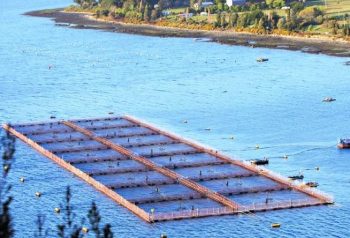
Chile fishermen race to recapture escaped salmon that could pose risk
Chilean fishermen were working yesterday to recover hundreds of thousands of salmon that escaped from a fish farm as environmentalists warned of possible risks if they are eaten by humans, the government said. A storm on July 6 damaged nine enclosures at Marine Harvest’s Punta Redonda Center near the southern city of Calbuco, freeing at least 600,000 salmon into the wild, the company said.,,, Some of the salmon had been injected with a course of antibiotics that was incomplete at the time of their escape, making them unfit for human consumption and prompting concern by environmental groups that the fish will make it into the food chain too early. >click to read<11:15
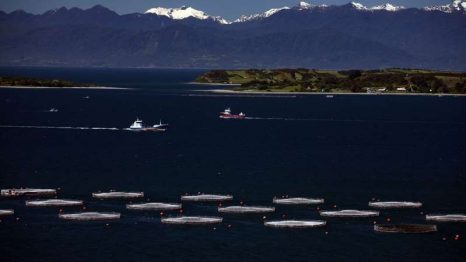
Great Salmon Escape Threatens to Taint Chile’s Fish Farms
About 900,000 salmon escaped from a Marine Harvest ASA farm during a storm on July 5, according to the Bergen, Norway-based company. The fish are not fit for consumption, Marine Harvest said in a press release. The company has recovered about 250,000 salmon and taken them to a nearby site, it said in a separate statement on July 9. About 680,000 fish are still missing and it is collaborating with the local Fisherman’s Federation to recover the remainder, Marine Harvest said. Chile’s salmon industry was already under attack for the use of hundreds of tons of antibiotics every year and allegations that the dumping of dead fish in the past have fueled algae blooms that damage the local fishing industry. >click to read<10:51
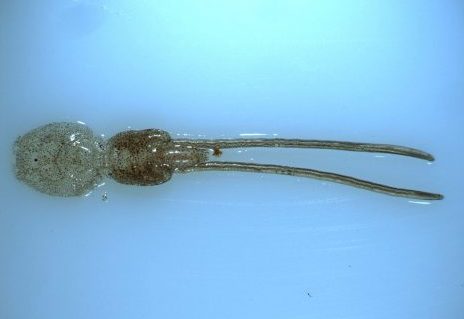
Parasitic sea lice plagues global farmed salmon industry
A surge of parasitic sea lice is disrupting salmon farms around the world. The tiny lice attach themselves to salmon and feed on them, killing or rendering them unsuitable for dinner tables. The lice are actually tiny crustaceans that have infested salmon farms in the U.S., Canada, Scotland, Norway and Chile, major suppliers of the high-protein, heart-healthy fish. Scientists and fish farmers are working on new ways to control the pests, which Fish Farmer Magazine stated last year costs the global aquaculture industry about $1 billion annually. click here to read the story 20:26
Toxic ‘red tide’ in Chile prompts protests and investigation of salmon farming
 An algal bloom ‘of biblical proportions’ has led to protests and health emergency as concerns raised over dumping of rotting salmon in ocean. Chilean authorities are investigating the country’s salmon-farming industry after an algal bloom carrying a virulent neurotoxin spread for hundreds of miles along the rugged coastline of Patagonia, triggering a health emergency and angry protests by fishermen. The huge “Red Tide” has grown rapidly over recent weeks, in what has been described as the country’s worst environmental crisis in recent years: dozens of people have been poisoned by the algal bloom which makes seafood toxic and has deprived thousands of fishermen of a living. But the spotlight is now being focused on the salmon industry amid allegations that the algal bloom may have been exacerbated by the dumping of rotting salmon in the open ocean and the massive piles of salmon faeces and salmon food now smothering portions of the seafloor. Read the story here 08:24
An algal bloom ‘of biblical proportions’ has led to protests and health emergency as concerns raised over dumping of rotting salmon in ocean. Chilean authorities are investigating the country’s salmon-farming industry after an algal bloom carrying a virulent neurotoxin spread for hundreds of miles along the rugged coastline of Patagonia, triggering a health emergency and angry protests by fishermen. The huge “Red Tide” has grown rapidly over recent weeks, in what has been described as the country’s worst environmental crisis in recent years: dozens of people have been poisoned by the algal bloom which makes seafood toxic and has deprived thousands of fishermen of a living. But the spotlight is now being focused on the salmon industry amid allegations that the algal bloom may have been exacerbated by the dumping of rotting salmon in the open ocean and the massive piles of salmon faeces and salmon food now smothering portions of the seafloor. Read the story here 08:24
Chile fishermen protest fishing limits







